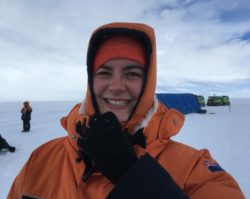Bryony Freer
 Name:
Name:
Bryony Freer
Job title:
PhD Researcher in Earth Observation of the Cryosphere
Area of work/study (pertinent to COP26) and why it’s important:
I am currently a PhD researcher at the University of Leeds and the British Antarctic Survey, where I use data from satellites like NASA’s ICESat-2 and ESA’s Sentinel-1 to study the Antarctic ice sheet. I am most interested in ice sheet grounding lines, which mark the boundary between the ice that sits grounded on the bedrock of Antarctica and the floating ice shelves around the coastline. They are really important to monitor because they indicate the stability of the entire ice sheet, helping us to understand how it’s being affected by climate change and contributing to future sea level rise.
What will you be doing at, or how are you involved in, COP26?
I will be attending the Blue Zone of COP26 from 10-12 November, where I will be presenting a side event alongside Heather Selley in the ICCI Cryosphere Pavilion, entitled ‘West Antarctica: Getz on the run’. This event will take place at 10am GMT on Wednesday 10 November and will be livestreamed on a number of different platforms: Facebook, Twitch, Cryosphere Pavilion Youtube and ICCI Youtube. We will highlight the importance of the Antarctic ice sheet within the global climate system and how data collected by Earth Observation satellites have revolutionised our understanding of the impact of climate change on our polar regions. I will also be attending the Green Zone on Friday 12 November representing SENSE CDT on the Space4Climate stand.
What are your hopes for the COP26 negotiations?
A very delicate balance exists between liquid water and solid ice. In the cryosphere this balance is a constant presence; even the smallest change in temperature can tip this seesaw one way or the other, with major consequences on the environment. Every fraction of a degree of warming that we can prevent could therefore be critical to avoid the catastrophic collapse of our ice sheets in the future. Limiting warming to 1.5°C above pre-industrial levels is still scientifically possible; it is whether our leaders can be brave enough to take decisive action, make ambitious commitments and set bold timeframes to allow this to happen. I hope that COP26 marks a point where politicians can step up, come together, and turn words and commitments into action.
Any tips for readers about climate action?
Climate action comes in many forms. As individuals we can make personal every-day decisions like reducing our car usage, avoiding long-haul flights and cutting down the amount of meat we eat. You can find out your environmental footprint and tips to reduce it for your lifestyle here.
But whilst these changes are important, we won’t get far enough to make a real difference without collective action resulting in structural changes to the economy and society, since these systems are so still closely tied to the use of fossil fuels. Governments cannot back large-scale policy changes if the electorate are not on board. Therefore putting pressure on businesses and policymakers, using your vote (if eligible!) and generally raising awareness of climate issues among friends and family are great ways to drive climate action.
